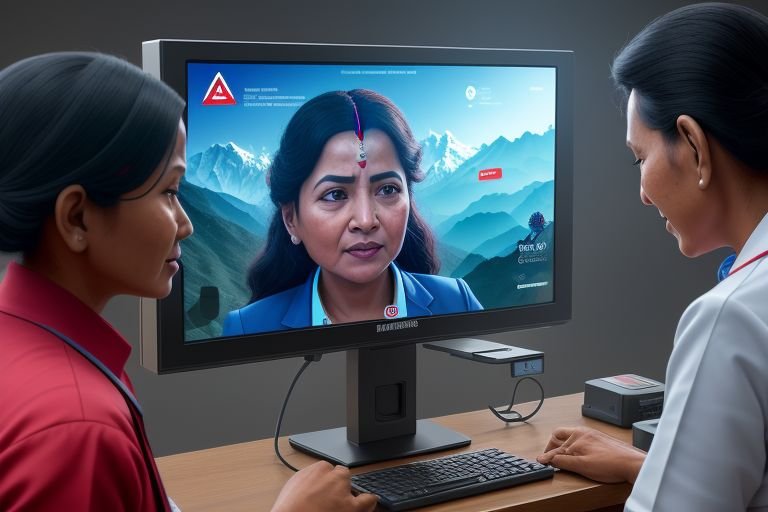Adding to its efforts to provide modern health care to its people Nepal has come up with a Digital Health System today on the date of the tenth of October in the year 2024. Another lofty project of the ministry under the overarching ongoing Digital Nepal plan is geared towards the modernization of health care in Nepal based on advanced technology and data analysis.
The Digital Health System that has been initiated with the belief of the two Ministries, Ministry of Health and Population and Ministry of Communication and Information Technology of Nepal can be considered as a step forward of Nepal in its pathway of achieving Universal Health Coverage. The system covers many subsystems of the delivery of healthcare services such as EHR’s, telemedicine, HIM, and the central repository for patient data.
This new system is anchored on a centralized electronic health record system, which will enable the providers of care services to track and retrieve the patient’s records on a real-time basis. This central planning approach is believed to greatly enhance the overall coordination of patient care, minimize medical mishaps, and significantly improve the total organizational efficiency of the health system. This will be advantageous to patients because regardless of where they turn for treatment in the country, they will have a full history of their symptoms at their fingers.
The new Democratic Health System will also signify the establishment of a broad telemedicine system. Through this network, people in distant remote health posts and primary healthcare centers will have direct communication with the specialist doctors in urban areas, which Nepal’s rural people have lacked for many years. With virtual visits and analysis services, people in the most rural areas will have the opportunity to have a consultation with an expert in no time.
Another component of the system is also emphasized, which is data analysis and public health monitoring. Benefits to be derived are, Health authorities will be in a position to identify disease outbreaks, health trends and allocate resources much more effectively after getting together and analyzing health information from all over the country. It is believed that, through such a data analytics approach, the public health indexes, as well as the capacity to manage public health threats in Nepal, will be strengthened substantially.
With a training program in the millions of dollars, the actual rollout of the Digital Health System has been preceded by a significant attempt to ensure that the various healthcare workers are capable of optimally using the newly adopted technology. In the past year, thousands of doctors, nurses, and other healthcare workers have been trained extensively on digital platforms and applications.
Both the privacy and the confidentiality of the data have been the utmost important considerations in the design of this system. The government has recently said that great measures have been taken to ensure the privacy of citizens’ health records. Some of the measures are as follows: providing end-to-end encryption solutions for data, controlling access, and conducting periodic security reviews to guarantee adherence to global data privacy rules.
The deployment of the system is believed to have a number of consequences for Nepal’s health care system. For patients, it is significant, as it provides convenient access to the needed services; the time is saved; and, accordingly, the quality of the service provided is increased. Thus, a coordinated working model will have beneficial implications to improve the top-bottom and bottom-top flow of operation, easy accessibility of the patient record, and advanced methods of decision support tools based on the data accumulated in the healthcare providers’ systems.
In this respect, the government and donors anticipate that it will dramatically improve the country’s capacity to address health risks from a public health standpoint. The vital information received from the system shall ensure that the health authorities can address the diseases immediately or even incidences in order to monitor and assess the impacts of the public health activities and consequently formulate policies according to research findings.
The Digital Health System also creates new opportunities for medical research in the conditions of Nepal. Collecting a large amount of anonymized health data in their hands, researchers will be able to investigate better disease dynamics, evaluate the effectiveness of certain therapies, and advance medical research around the world.
Yet, the keys to its [the Digital Health System’s] success have been entering the country: there is still a long way to go and many obstacles to overcome in order to achieve its successful implementation. These the challenges that are as follows: Some of the existing challenging issues that need to be focused on are the following: Infrastructure issues, especially in the region where connectivity problems are acute; The clash of inertia with new technology-based solutions among some representatives of healthcare workers who still rely on paper-based tools and instruments.
However, the mood among health officials and experts in technological innovation is positive. In our study, many people regard the Digital Health System as a game changer that will enable the Nepalese health sector to move to a higher level. It has been seen as a promising tool for making changes in all areas, such as effectiveness, accessibility, quality, etc.
During this time, the whole world is witnessing Nepal making its first steps towards a digital health journey. If the plan comes to fruition, Nepal’s Digital Health System could help other developing countries seeking to use technology to enhance the efficiency and access of health care services for the populace.
The establishment of the Digital Health System CO Mantha is a sign of hope to realizing healthcare for all in Nepal. With the system established and gradually growing, it also holds potential to become an important determinant of the healthcare system in future in Nepal in making it closer to its vision of a healthier and prosperous nation.


